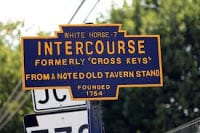Wacky Town Names In Lancaster County
February 21, 2011
For visitors to Lancaster County, one of the first clues this is a place with a charming and fascinating history comes with a glance at a map. As you pass through towns like "Paradise" and "Blue Ball", you may wonder where those towns got their storybook names. The origins of many of the towns and villages have, unfortunately, been lost to history. But here are brief backgrounds on several of them:
Intercourse
There is much speculation about the origins of this village's name, which was founded in 1754 and originally called Cross Keys.

The other theory centers around two roads - the old King's Highway between Philadelphia and Pittsburgh, now Route 340 (Old Philadelphia Pike), and the road from Wilmington, Edl., to Erie, whihc intersected it in teh middle. That intersection is thought by some to be the basis for teh name "Intercourse"
Paradise
According to records, this town to the east of Lancaster was named when one Joshua Scott, who later became known for his map of the county, stood in the middle of a road admiring his surroundings.
He remarked that the town should be called Paradise, and most people agreed wtih him. That was in 1804. In 1843, folks in teh surrounding township decided they weren't satisfied with their name, which at that time was Pequea. So the people of Pequea Township took their cue from teh nearby village and the entire township became Paradise.
Blue Ball
Like many towns in teh nation's early days, this hamlet took tis name from a tavern, which was located "at the sign of the Blue Ball," established by Robert Wallace in 1766.
Kinzers
This village was named not for a tavern but for a hotel, which was built by a gentleman named Harry Kinzer in 1834 for men who worked on the railroad in the area.
Bareville
This town just east of New Holland was named for the physician Dr. A.S. Bare, who was one of several founders in the mid-1800s.
Bird in Hand
The old legend of the naming of Bird-in-Hand concers the time when the Old Philadelphia Pike was being laid out between Lancaster and Philadelphia.
The story goes that two road surveyors working on the construction project discussed whether they should stay at their present location or go on to the town of Lancaster. One of them supposedly said, "A bird in the hand is worth two in the bush," which means it is preferable to have a small but certain advantage than the mere potential of a greater one; and so they stayed. By 1734, road surveyors were making McNabb’s hotel their headquarters rather than returning to Lancaster every day. The sign in front of the inn is known to have once "portrayed a man with a bird in his hand and a bush nearby, in which two birds were perched," and was known as the Bird-in-Hand Inn.
Another variation on the story also relates to the prominent tavern sign. The Conestoga wagoners (many of whom could drive a team of six horses a lot better than they could read) knew that they had arrived at the Bird-in-Hand Hotel by seeing its distinctive sign - which became the defacto name for the village over time.
Ephrata
The borough of Ephrtata was founded in 1732 and is named after Ephrath, a biblical town in what is now Israel. The community was named by Conrad Beisel and his followers, who were the first settlers in the area. They founded what is now know as the Ephrata Cloister along the Cocalico Creek.
As you can see, the story behind the names of Lancaster County towns and villages are as diverse as the communities themselves. Hopefully learning about their origins has provided enough of a tease to make you want to visit, explore and discover more for yourself... which is easy to do when you base yourself at the Historic Smithton Inn... we've got great accessibility to all these quaint towns.



